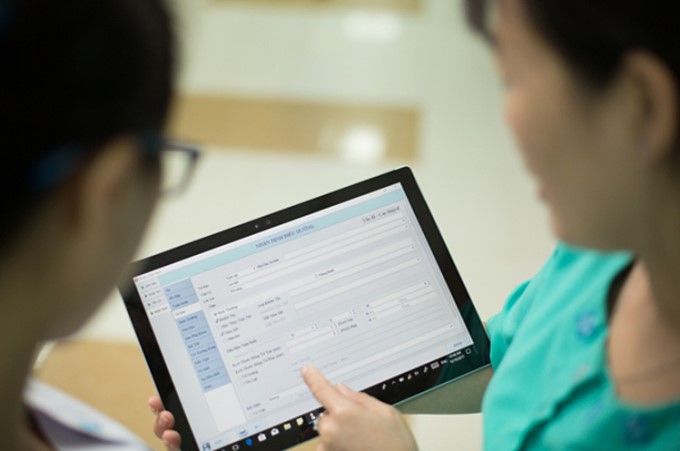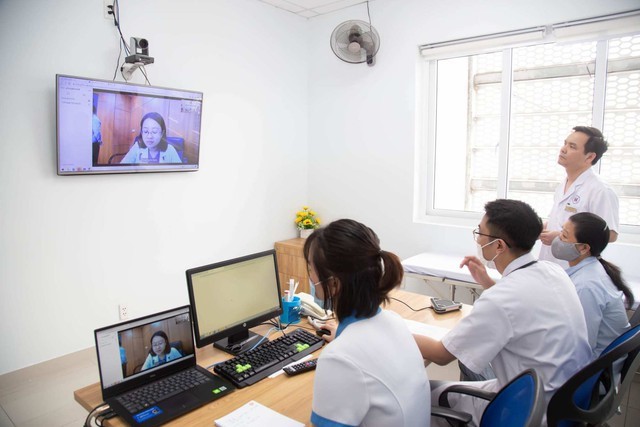In recent years, digital transformation (DX) has significantly impacted various sectors in Vietnam, with healthcare emerging as one of the most critical areas for DX application. The adoption of digital technologies in healthcare is rapidly enhancing the quality, efficiency, and accessibility of healthcare services across the country. This article explores the current state of digital transformation in Vietnam’s healthcare sector, highlights key challenges, and showcases the opportunities and innovations driving this transformation forward.
Current Landscape of Healthcare Digital Transformation in Vietnam
Health expenditure in Vietnam is valued up to $20 billion in 2021 and could rise to $23.3 billion in 2025 and $33.8 billion in 2030, equivalent to a compound annual growth rate (CAGR) 2025-2030 of 7.6%.1]
The sector is undergoing a transition fueled by a growing need for quality healthcare services amid rising demand due to an aging population and increasing health awareness. The Vietnamese government and private sectors are working together to integrate digital technologies in healthcare to improve patient outcomes, enhance service efficiency, and reduce healthcare costs.
Vietnam’s government has implemented policies to promote digital transformation in healthcare. Notably, the Decision No. 4888/QD-BYT, which was issued in 2019, sets the strategic direction for a smart and digital healthcare system in Vietnam. This policy outlines a comprehensive roadmap for digitalizing healthcare, emphasizing Electronic Medical Record (EMR), Hospital information system (HIS), telemedicine, and digital health monitoring.
Additionally, the Prime Minister’s Decision No. 1165/QD-TTg in 2023 established a national strategy for the development of the pharmaceutical industry, aiming to digitize data management and supply chain monitoring within the pharmaceutical sector. The government also supports the development of public-private partnerships (PPP) to leverage technological expertise from private firms, accelerating DX implementation in Vietnam’s healthcare sector
Key Areas of DX Application in Healthcare
Digital solutions, including telemedicine, electronic health records (EHR), Telemedicine and Remote Healthcare, Artificial intelligence (AI) in diagnostics and treatment, and digitalized supply chain management, are at the forefront of this transition.
Although, the solution is diverse, the level of DX still is still in the early stage and is not yet widely applied in healthcare facilities.
Electronic Health Records (EHR) and Patient Data Management
Source: VNExpress
One of the essential DX applications in healthcare is the adoption of EHR and EMR systems. Traditionally, patient data in Vietnam has been managed on paper, leading to issues like data fragmentation, loss of information, and inefficient resource management. Through DX, hospitals can consolidate patient data into a single, secure platform accessible to authorized healthcare professionals. This digital transition enables faster diagnosis, more personalized treatment plans, and an overall improvement in patient care.
Telemedicine and Remote Healthcare
Source: Bộ Y Tế
Telemedicine has become increasingly popular in Vietnam, especially in the wake of the COVID-19 pandemic. This digital service enables patients to consult with doctors remotely, reducing the need for in-person visits and easing the burden on crowded hospitals. For people living in rural or remote areas, telemedicine is a lifeline, providing access to specialized medical advice without the logistical challenges of travel. The Ministry of Health has endorsed the expansion of telemedicine platforms, which are now supported by private-sector applications, improving healthcare accessibility for millions of Vietnamese citizens.
Artificial Intelligence in Diagnostics and Treatment
Source: Hanoimoi
Artificial intelligence is making a profound impact on diagnostics and treatment, particularly in radiology and pathology. AI algorithms analyze medical images with remarkable precision, assisting doctors in diagnosing conditions like cancers, cardiovascular diseases, and respiratory disorders. Furthermore, AI-powered predictive analytics can assess patient risk factors and suggest preventive measures, aligning with Vietnam’s shift towards preventative healthcare. AI also supports real-time decision-making, enabling healthcare professionals to offer more accurate and timely diagnoses, ultimately saving lives.
Healthcare Supply Chain Management
The digitalization of supply chain management in healthcare addresses inefficiencies in inventory management, distribution, and resource allocation. With digital tools, healthcare providers can better monitor stock levels, predict shortages, and optimize logistics to ensure critical supplies and medicines are readily available. The use of blockchain technology has also been explored to enhance transparency and traceability in pharmaceutical supply chains, addressing concerns about counterfeit drugs, which remain a challenge in Vietnam’s healthcare system.
Patient-Centric Services and E-Pharmacy
The demand for convenient healthcare services has spurred the growth of e-pharmacy platforms in Vietnam. With the rise of online shopping and e-commerce, patients can now purchase medicines and health products from licensed pharmacies online, with delivery to their doorsteps. This DX application not only improves accessibility but also enhances regulatory compliance by creating a traceable record of drug distribution. Furthermore, digital tools allow healthcare providers to engage patients more effectively, offering mobile apps for appointment scheduling, follow-up care, and real-time health monitoring.
Key Players in Vietnam’s Healthcare DX
In Vietnam, player from both domestic and FDI has participated in the market. Major state-owned telecommunication companies like FPT, VNPT, Viettel have invested in healthcare data management system and AI. Besides state-owned, giant private companies or Start-up has also dynamically developed wide range of solution.
- – FPT Corporation: A Vietnamese IT giant, FPT provides DX services, including AI-powered diagnostics and data management, across various hospitals and clinics.
- – Viettel Group: Viettel’s healthcare platform, Viettel Telehealth, offers telemedicine services nationwide, reaching underserved areas with reliable, remote consultations.
- – VNPT: The state-owned telecom provider supports digitalization in hospitals and clinics, focusing on EMR and HIS integration.
- – Vingroup: Part of Vingroup, Vinmec has led digital adoption in diagnostics and telemedicine, applying AI for imaging analysis and promoting patient-centered care. Another company – Vinbrain is delivering AI-based and IoT products supporting the diagnostic and data management.
Challenges to Digital Transformation in Healthcare
Despite substantial progress, the digital transformation of Vietnam’s healthcare system faces several hurdles.
Lack of Infrastructure: Many hospitals, particularly in rural areas, lack the infrastructure needed to support advanced digital solutions. Limited access to high-speed internet, inadequate IT infrastructure, and budget constraints hinder the implementation of digital systems. Although the government has invested in building healthcare infrastructure, the digital divide remains a significant challenge.
Data Privacy and Cybersecurity Concerns: With the digitalization of patient records and the increasing reliance on cloud-based data storage, data privacy and cybersecurity have emerged as primary concerns. Patients’ medical records are sensitive, and any breaches could have severe consequences. Ensuring data security and compliance with international data privacy standards will require stronger regulations, robust cybersecurity frameworks, and regular monitoring.
Shortage of Skilled Professionals: The successful implementation of digital healthcare systems requires skilled IT and medical professionals who can handle complex digital tools and technologies. However, Vietnam currently faces a shortage of such professionals, which could slow down the pace of digital transformation in healthcare. Training healthcare workers on new systems and technologies is essential to maximize the benefits of DX.
Resistance to Change: Adapting to digital processes can be challenging for healthcare workers accustomed to traditional methods. There is often resistance to change, particularly among older staff, due to unfamiliarity with new technologies. This cultural barrier to DX adoption needs to be addressed through proper training programs and change management strategies.
Opportunities and the Future of DX in Healthcare
The potential for digital transformation in Vietnam’s healthcare sector is vast. As the government and private sector continue to invest in DX, the healthcare system is expected to become more efficient, accessible, and patient-centered. Some of the promising opportunities for DX in healthcare include:
Enhanced Patient Experience and Personalized Care: With digital tools, healthcare providers can offer personalized treatment plans and engage patients through mobile health apps, improving the overall patient experience. Telemedicine and e-pharmacy services make healthcare more accessible, particularly for those in remote areas. This shift toward patient-centered care will enhance patient satisfaction and drive positive health outcomes.
Growth in the Health-Tech Sector: The increasing demand for digital healthcare solutions presents growth opportunities for health-tech startups and technology providers. Companies specializing in AI, data analytics, and telemedicine platforms are likely to thrive in this emerging market. As partnerships between healthcare providers and tech companies expand, Vietnam’s health-tech ecosystem will become a critical contributor to the country
[1] https://theinvestor.vn/vietnam-health-expenditure-to-reach-338-bln-in-2030-analysts-d8561.html
| B&Company, Inc.
The first Japanese company specializing in market research in Vietnam since 2008. We provide a wide range of services including industry reports, industry interviews, consumer surveys, business matching. Additionally, we have recently developed a database of over 900,000 companies in Vietnam, which can be used to search for partners and analyze the market. Please do not hesitate to contact us if you have any queries. info@b-company.jp + (84) 28 3910 3913 |
Read other articles






















































